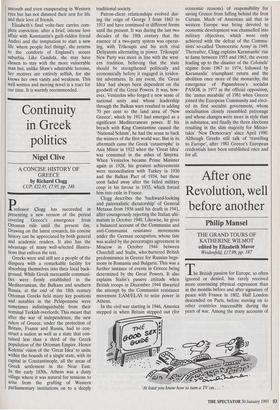When the chips and the Wall are down
Liliana Brisby
PRESENT FROM THE PAST by Annabel Dilke Deutsch, £13.99, pp. 240 Let me declare an interest: I belong to the small band of enthusiasts who regard this author's The Party Wall (nominated for the 1989 Sunday Express Award) as the funniest and most truthful social comedy about the life of East European exiles adrift in London. Though it revisits the theme of the colliding values of East and West, Present from the Past is a very differ- ent novel, plumbing new depths. This time the confrontation occurs in a thinly dis- guised Bulgaria after the fall of the Berlin Wall. This momentous event slides off the backs of Elizabeth Martineau's rich and smug English friends, but has a cataclysmic effect on her cocooned second marriage to James, who was her refuge after the tragic disappearance of her first husband Kon- stantin, a dissident from Eastern Europe abducted by his country's secret police. The author wears her heart on her sleeve — an act of no mean courage in an age that looks on cynicism as a badge of sophis- tication. Not for her the moral ambiguities of Greeneland, the Cold War conceits of John le Cane or the deliberately provoca- tive even-handedness which Julian Barnes uses to such dramatic effect in The Porcu- pine, his recent fictional account of the trial of Bulgaria's fallen Communist leader. Annabel Dilke leaves the reader in no doubt as to who wears the white and black hats in her story. As the visiting English- woman tries to exorcise her past and pieces together the lives of Konstantin's family and friends under 40 years of Communist dictatorship, the regime's record is seen as one of unremitting evil. Yet the people she discovers and befriends are no celluloid heroes. Dilke has observed them with sym- pathy and affection, but the warts are all there in comic profusion. There is a partic- ularly funny description of the culture shock experienced by the American children of a Bulgarian returnee who have to cope with an outdoor lavatory and no ketchup.
The poignancy of this novel derives in part from the author's own tragic experi- ence — she was married to the Bulgarian writer Georgi Markov who paid with his life for his devastating exposure of the priv- ileged party elite in Bulgaria. Now rehabili- tated and restored to his rightful place in Bulgarian literature — though his murder- ers have yet to be indicted— Markov has become a symbol of the still unresolved struggle for the new democracy. However, the emotional trigger for Present from the Past is not only the deep wound inflicted by the past but also a strong urge to bridge the gulf of incomprehension and indifference dividing the cosseted denizens of the West from the survivors of Stalinism.
Here the literary device chosen to point the contrast is open to criticism for its over- simplification of the scenario. It is difficult to imagine a sillier, more spoilt and philis- tine set than the English friends Elizabeth is entertaining in her opulent middle-class house outside Ascot in the opening chap- ter. The cards are similarly stacked against the unbending, sexually repressed, self- made English husband, who remains a cliché; surely, James can hardly be blamed for the restlessness of his wife who chose safety in a matrimonial cage that he has done his best to gild for her. Fortunately, by Chapter Four the East European dicta- tor has been toppled and Elizabeth is on her way eastwards. By now one can hope that readers who may have been seduced by the glossy setting of a typical bestseller beginning will be hooked to stay the novel's more demanding and rewarding course. What is on offer is no less than the truthful depiction of individual lives in post-war Eastern Europe and a close acquaintance with unfamiliar characters seared by suffer- ing, which can make them seem strange, uncouth and even exasperating in Western eyes but has not dimmed their zest for life and their love of friends.
Elizabeth's final volte-face carries com- plete conviction: after a brief, intense love affair with Konstantin's guilt-ridden friend Andrei and the temptation to start a new life 'where people feel things', she returns to the comforts of England's secure suburbia. Like Candida, she may have chosen to stay with the more vulnerable man but, unlike Shaw's admirable heroine, her motives are entirely selfish, for she knows her own vanity and weakness. This well written and moving novel is a tract for our time. It is warmly recommended.











































































 Previous page
Previous page